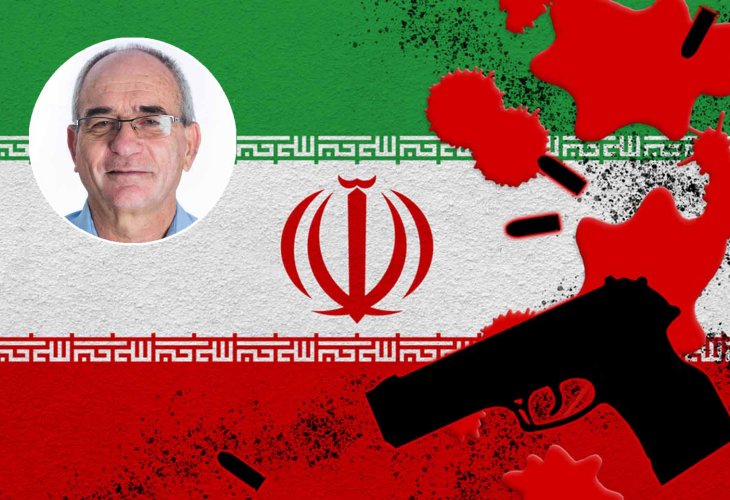How Are Iranian Nuclear Officials Eliminated? Experts Analyze
Riding motorcycles, armed with silenced pistols, they disappear immediately after the elimination, leaving another Iranian official lying on the ground, bleeding. Former defense officials try to outline the profile of these assassins.
 (Photo: Shutterstock)
(Photo: Shutterstock)Senior figures in the Iranian nuclear apparatus already know they are targets. It's not a surprising fact given the frequent reports in Iranian and international media about another Iranian figure, more or less senior, who is no longer among the living thanks to an operation attributed to Israel. To understand how these eliminations work, we spoke with Yaakov Kedmi, a graduate of the National Security College and author of 'Lost Wars'; with Brig. Gen. (Res.) Yossi Kuperwasser, who has years of service in the defense system including as head of the IDF's Research Division, and is now a researcher at the Jerusalem Center for Public Affairs; and with Yair Ravid, a former Mossad officer. Each offers a different perspective, but the point remains the same: Iran is very embarrassed by these publications.
One of the latest eliminations that embarrassed the regime in Iran took place recently on Mujahideen al-Islam Street in Tehran, where several Iranian regime officials reside. The sound of a motorcycle was heard on a summer day, with two armed men on the vehicle on their way to another shadow operation in the long-standing conflict between Israel and Iran. Their target was Col. Hassan Sayad Khodai, a senior commander in the Revolutionary Guards, whose terror tentacles stretched from a quiet neighborhood in Iran to Syria.
 Brig. Gen. Kuperwasser (Photo - Courtesy of the Jerusalem Center for Public Affairs)
Brig. Gen. Kuperwasser (Photo - Courtesy of the Jerusalem Center for Public Affairs)The motorcyclists approached Khodai, who was sitting in an old Kia Pride vehicle, unfortunately unarmored, and shot him multiple times at point-blank range while he was parked in front of his home. The Iranian official stood no chance and died on the spot. The first to discover Khodai's body would be his wife. The next to arrive would be members of the Revolutionary Guards and Iranian security forces, who rushed to the scene and tried to apprehend the two assassins, who had already managed to flee.
In an attempt to obscure the embarrassment, the republic soon released a statement claiming it had captured an Israeli spy ring, and the Fars News Agency simultaneously presented evidence of the exposure of the espionage cell. Are they indeed Israeli spies? It's not certain. "What is clear, however, is that those who are attributed to Israel most likely have not been captured," believes former IDF Intelligence Research Division head Brig. Gen. Yossi Kuperwasser.
The Motorcycle Method
Why are the eliminations carried out on motorcycles specifically? We wonder
"According to foreign publications, Israel eliminates Iranian officials using assassins who travel on motorcycles," Kedmi agrees. He notes, "The use of motorcycles for elimination is one of the best methods: there are several reasons," he says. "Firstly, motorcycles in an urban area are difficult to identify, unlike cars, which have a noticeable model and color. Additionally, motorcycles can quickly leave the scene, without having to stop in traffic jams, and can pass through narrow areas where cars cannot. And perhaps most importantly, it is easy to hide the motorcycles after the elimination at a predetermined escape point and flee from there by car or other means."
For example, why was Khodai eliminated?
According to Ravid, a former Mossad and intelligence officer, "The reason for eliminating such a person usually relates to fresh information about a terror activity he plans to execute. In this field, they do not engage in revenge but prevention, given that the significance of each elimination can be far-reaching. In fact, no serious intelligence agencies engage in carrying out vengeance operations. In this case, he was most likely a ticking bomb from Israel's perspective, assuming they are responsible for his elimination."
Brig. Gen. Kuperwasser believes that the average citizen in Iran did not know Khodai's name, because "he was not a figure like Qassem Soleimani, known to every Iranian, but he was certainly a man marked for death, and therefore one can presume this elimination was carried out for justified reasons. The man was involved in activities within Unit 840 of the Revolutionary Guards. It can be stated with certainty that this unit has carried out several attacks against the State of Israel, including attempts on the Syria-Israel border, although it is unclear if the commander who was eliminated was involved in them."
How complex is such an operation?
Kedmi: "This is not the first time similar events have occurred, so I don't think it's a particularly complex operation. However, unlike in the past, this is not a nuclear scientist, so Israel was almost certainly responsible for these eliminations. Here, it's someone engaged in terrorist activities on behalf of the Revolutionary Guards, but the method of execution was carried out in the same manner."
Ravid: "The elimination itself is quite a complex procedure that intelligence forces prepare for a long time. Planning such an elimination operation can take many months and involve a lot of people who are participants in its planning."
How does Iran regard these eliminations?
Kuperwasser: "If we take Khodai's elimination for example, Iran certainly addressed the elimination, published his name, and the country's official spokespersons even issued a condolence message to the family. However, despite revealing Khodai's identity, Iran remained silent in the days following about his exact role and even refrained from providing details about the manner of elimination that took place in the middle of the day in the capital Tehran— something that shows the depth of embarrassment among the Iranian authorities.
"For Iran, it's a tremendous blow," Kuperwasser continues. "In fact, the area where Khodai was eliminated is an upscale neighborhood that was supposed to be secure and is not far from the Iranian parliament, the Majlis. Bringing this elimination unit into the heart of Tehran to eliminate the man was likely intended—assuming it was Israel—to hinder his ability to spread terror on Israeli targets worldwide."
What are the implications of the elimination?
According to Kuperwasser, "The elimination has several immediate implications. Beyond the fact that Iranian officials now need to be more concerned about their personal security, the elimination brings about strong feelings in the senior Iranian leadership, frustration, and embarrassment that Iran is unable to defend itself. The Iranians, in turn, try to retaliate against Israel, but they almost never succeed, except for a past case where they managed to abduct Elhanan Tenenbaum to Lebanon in a brilliant operation."
However, Kuperwasser clarifies that the Iranian threat has not disappeared. "Iran is constantly trying to harm Israel. The fact that it has not succeeded in most cases does not mean the Iranians are not dangerous. But this reality shows that Iran has always tried to harm Israel, so this or that elimination does not change the picture but leaves the situation as it stands," he concludes.

